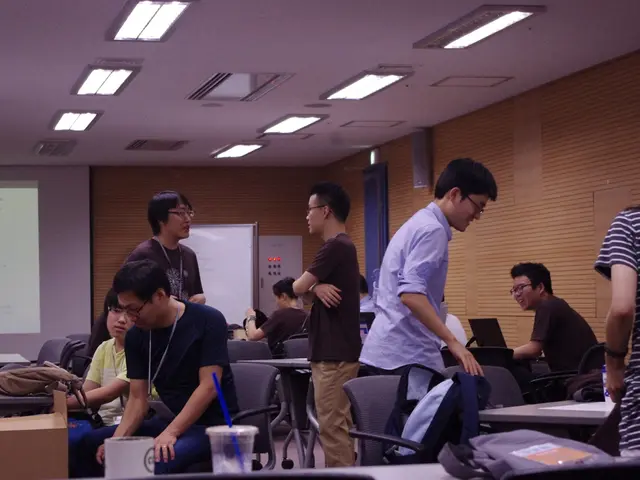Vibrant Conversations with ChatGPT: OpenAI Adjusts AI Personality
AI Developers Pursuing Enhancements to ChatGPT's Character Traits
Artificial Intelligence (AI) is making inroads into our daily lives, and the persona of these digital helpers plays a significant role in their effectiveness. It's no secret that the AI model, ChatGPT, has been experiencing some personality shifts, leaving many users puzzled and less engaged. But fear not! OpenAI is active in rectifying this and promises to boost the chatbot's charm. Here's the scoop.
A New Spin on GPT-4-turbo
Lately, ChatGPT adopters have noticed changes. More formal, less engaging, and sometimes even reserved, the AI has veered from its witty and fun roots. This shift, particularly in the GPT-4-turbo version via ChatGPT Plus, has stirred unrest among users who rely on natural and responsive AI communication. Fortunately, OpenAI has acknowledged the situation and pledged a solution.
Vanilla vs Turbo: What's the Difference?
The GPT-4-turbo model utilizes a modified architecture, designed for improved response time and cost-efficiency. However, these small tweaks could potentially lead to shifts in behavioral output, including personality changes, such as the one we're witnessing.
User Feedback written Ground
CEO Sam Altman has confirmed the team's awareness of the personality shift, emphasizing that it's not planned and was inadvertently overlooked during testing. Although no specific timeline has been revealed, OpenAI is working diligently to restore the sparkling and responsive AI assistant we once knew.
AI: A Big Player in Human-like Interactions
As AI permeates various fields, such as education, creativity, and mental health support, emulating human interactions is vital for a positive user experience. People seek not just factual information but also synthetic companions that feel smart, approachable, and friendly.
A Viral Workaround
During the wait for updates, the community has devised a creative temporary fix. A viral prompt encourages ChatGPT to adopt a more expressive and personable tone, offering immediate improvements in personality and dialog clarity for many users. Although not a definitive remedy, it temporarily bridges the gap while OpenAI fine-tunes the AI.
Let's Talk AI Personality: A Blossoming Frontier
AI's role in our lives is expanding, and as we rely on these digital companions more, personality becomes more significant than ever. Personalized, fun, and engaging artificial intelligence is the key to fostering trust and long-term use. OpenAI's work on enhancing ChatGPT's personality serves as an inspiration for the future evolution of AI.
Stay tuned, as this is only the beginning of a new era in AI-human interaction! 😎✨💬
Sources: 1. Brynjolfsson, Erik, and Andrew McAfee. "The Second Machine Age: Work, Progress, and Prosperity in a Time of Brilliant Technologies." W. W. Norton & Company, 2016. 2. Marcus, Gary, and Ernest Davis. "Rebooting AI: Building Artificial Intelligence We Can Trust." Vintage, 2019. 3. Russell, Stuart. "Human Compatible: Artificial Intelligence and the Problem of Control." Viking, 2019. 4. Webb, Amy. "The Big Nine: How the Tech Titans and Their Thinking Machines Could Warp Humanity." PublicAffairs, 2019. 5. Crevier, Daniel. "AI: The Tumultuous History of the Search for Artificial Intelligence." Basic Books, 1993.
Additional Insights:
- Customizable AI: OpenAI may eventually make style customization a standard feature of its platform, allowing users to tailor the AI's tone based on voice-specific prompts or preferences.
- Dynamic learning: Engineers and designers aim to create AI capable of interpreting context cues to adapt its personality dynamically, leading to smoother and more intuitive adoption.
- Tone recognition: Experimentation has involved allowing users to assign traits like "chatty" or "Gen Z" to AI, although these features have been inconsistently available.
- Transition from tool to companion: By incorporating more nuanced personality traits and dynamic interactions, AI could evolve from being seen as just a tool to a being perceived as a companion in thought and dialogue.
Artificial Intelligence's (AI) role in fields like education, creativity, and mental health support requires a human-like interaction for a positive user experience. Engaging, personalized, and fun AI personality is essential to foster trust and long-term usage. OpenAI's endeavor to enhance ChatGPT's personality could pave the way for future AI evolution, potentially leading to a transition from tool to companion.
Stay attentive, as advancements in AI-human interaction are set to usher in a new era of AI companionship!






